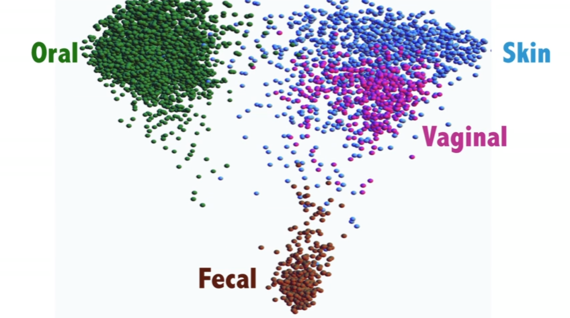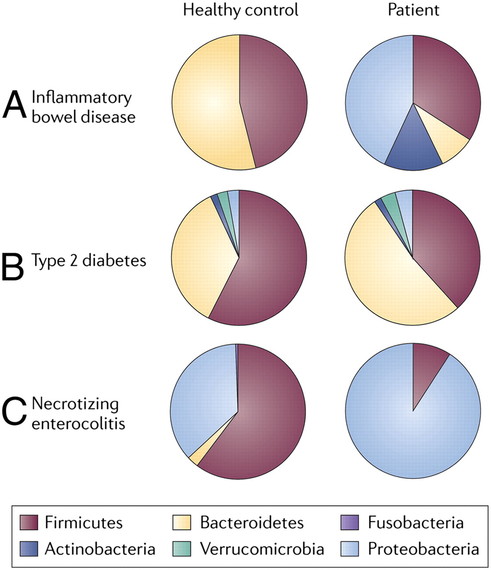Your microbiome can mean the difference between life and death in cancer.
Developments in microbiome sequencing techniques are leading to personalized therapies for a number of diseases.
The trillions of bacteria in our gut are critical for a wide range of key functions. While many are aware that our microbiota is important for digestion, it is now known that it also plays a key role in our immune system. The gut microbiota consists of up to 2,000 different species of bacteria, as well as other kinds of microbes, including parasites and viruses.
Human microbiome data from 250 healthy individuals. Each point represents one microbial community from one body site on one person. (Courtesy of Knight Lab)
Scientists estimate that there are three to six times more bacteria in our bodies than the ten trillion human cells each of us have. With improvements in DNA sequencing technologies, we are now capable of quickly and cheaply identifying the makeup of an individual's microbiota. This process can be repeated to detect trends and patterns over time. In the near future, most of us will do regular microbiome checkups to monitor a wide range of conditions in the body.
Mapping your microbiome is critical to maintaining good health. Millions of people today regularly consume food-based probiotics and probiotic supplements without any map of their current bacteria. People eat yogurt, drink kombucha, and consume other fermented foods in the hopes of improving their internal flora. This would be the same as getting sick and instead of getting tests done to determine a diagnosis, just blindly taking grab bag of medicines and hoping one of them will solve the problem. It makes much more sense to first map each person's microbiome to assess where they are lacking and only then carefully choose a proper supplement or eat certain bacteria-rich foods. In future articles, we will review the main ways to easily map your microbiome with a home kit that you mail in to a testing service.
Differences between the microbiome of healthy individuals versus patients with IBS, diabetes, and necrotizing enterocolitis. (http://pediatrics.aappublications.org/content/129/5/950)
Microorganisms in the gut can be used to empower the immune system to fight cancer, as opposed to traditional therapies that dramatically weaken it.
Perhaps the most astonishing aspect of the microbiota is its control over the immune system. Particular species of bacteria have been identified for their ability to upregulate the activity of antigen-presenting cells, or APCs. Without properly functioning APCs, the immune system cannot respond to threats, whether it be a virus or tumor. When they are doing their job, APCs are able to bring the threat to the attention of your B and T-cells, which initiate a chain of events to attack and eradicate the threat. The observation that Bifidobacterium, many strains of which are found in the gut, are able to increase the activity of APCs, has the potential to change the way treatment of cancer and other diseases is approached.
As with all systems in the body, balance is key. In the immune system, there is a checkpoint that stops the T-cells from overdoing it. Unfortunately, many cancer cells are able to take advantage of this mechanism to shut down the T-cell activity before the job is done. After a decade of research, a therapy was developed to prevent tumor cells from cheating the system. The therapy has been shown to improve the activity of T-cells in up to 35% of patients with melanoma, a form of skin cancer. A recent study published in Science reported that combining this checkpoint blockade therapy with supplements of Bifidobacterium could produce a much stronger immune response to tumor cells.
The University of Chicago research team found that variations in intestinal microbiota affected the growth of melanoma in mice. Mice who received an oral supplement of Bifidobacterium improved tumor control to the same degree as those who received the checkpoint blockade therapy, in comparison with the minimal tumor control exhibited by mice receiving neither. When mice were treated with both Bifidobacterium and checkpoint blockade therapy, tumor outgrowth was almost completely abolished.
This treatment involves no chemotherapy or radiation, instead, it empowers the natural mechanisms already present in the immune system using antibody therapy and a commercially available Bifidobacterium supplement to increase the activity of the APCs. The Bifidobacterium supplement used in the Science study to treat melanoma can be purchased for a mere $42 a bottle.
This holds the promise of increasing the efficacy of anti-PD1 checkpoint inhibition immunotherapy, which currently is only effective for 25-35% of patients for a durable response. There are reports of greater numbers with a combination of a CTLA4-blocker and anti-PD1 but this is a difficult treatment with very high probabilities of toxic side effects. If we can increase the durable response of anti-PD1 therapy to 65% or more of patients, we will change the face of cancer treatment.
In addition to cancer, it is becoming well known that the bacteria in your gut have a big effect on the digestion system. Irritable bowel syndrome, IBS, is a disorder of the gut that affects about one out of ten people in the world. C. diff, a disease named for the bacteria causing it, is an infection causing a wide variety of potentially life-threatening problems in the gut. Since these diseases are associated with an imbalance of bacteria in the gut microbiota, fecal matter transplants (FMTs) can treat the condition by reintroducing a healthy assortment of bacteria to the gut. As with probiotics, sequencing the microbiome would allow for a more patient-specific therapy directed at the problem. This same approach could be applied to the treatment of any number of diseases, completely changing the way we think about individualized therapy.
Stay tuned for more articles on the microbiome and cancer breakthroughs. We will also cover the human virome -- the collection of all the viruses resident in our bodies -- some dormant for years. The new approach to the microbiome and virome will change medicine as we know it.
A. Sivan and L. Corrales et al. "Commensal Bifidobacterium promotes antitumor immunity and facilitates anti-PD-L1 efficacy." Science 350.6264 (2015): 1084-089.
http://science.sciencemag.org/content/350/6264/1084.full

